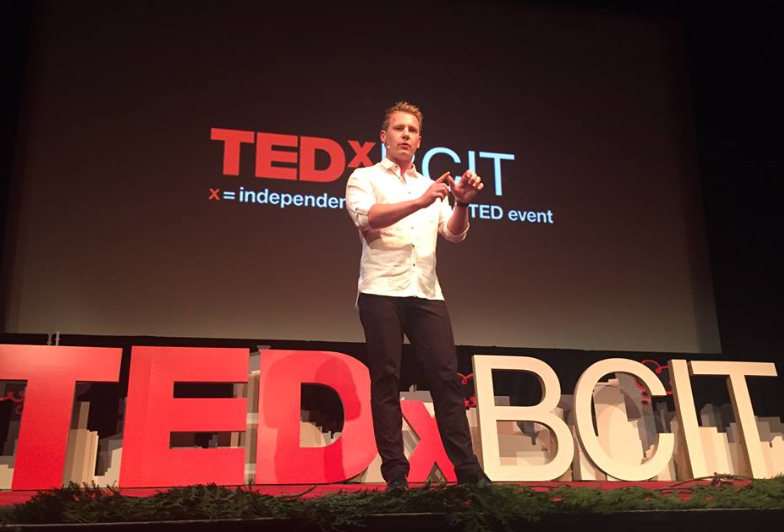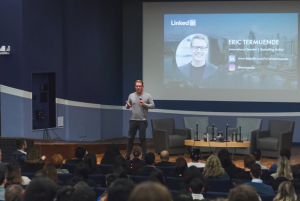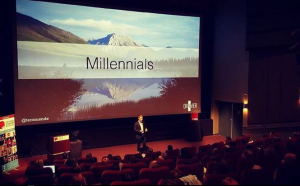It seems these days that everyone is talking about employee engagement’s red-hot cousin – the company experience. Creating a compelling employee experience is quickly becoming one of the most vital aspects of a business. But what exactly is it?
We recently spoke with Eric Termuende about the need for effective interactions and touch points, and their direct implications on a company’s success. Eric Termuende is the co-founder of NoW Innovations, and his goal is to remove the negative connotation associated with work. Whether it’s consulting businesses on how to ‘rethink work’, writing, or public speaking, Eric is well-educated in the role HR and operational practices play in maintaining a successful company.

What do you see as emerging trends in work that you are most excited about?
We are seeing the integration and utilization of technology more than ever before. This allows companies to focus more on the people and less on the mundane things we would have had to spend time on in the past. Since people have fewer administrative tasks, work is shifting to be more experiential. The focus is now much more on the experience, less on skills.
What exactly does “Company Experience” mean?
For so long, the company experience has been about a job description that doesn’t really describe the job. But true employee experience is much bigger than the 9 to 5! It’s about the employee’s life experiences as a result of the job. Company experience is about outlining the life an employee can have because they work for a specific company, versus if they worked somewhere else. Companies should be hiring for who their employees are, not what they are.
What do you mean when you talk about the transition from company values to company experience?
A hypothetical person might value waking up at 6:00AM and running before work and then working with a team in an open concept environment. Then, they may value going home and making dinner with their family and going to bed. But companies haven’t really made it past integrity, honour and respect for values. The problem is that companies don’t measure against or exemplify how those values are lived in the workplace. If we talk about experiences and a day in the life of an individual because of their job, it then shows us what their values really are. Values come from your experiences.
Why have “company values” lost impact?
This is a bigger, more human question because we have more access to information than everbefore. There is more content available on the internet and it is getting difficult to differentiate language. We use the word ‘amazing’ to describe our coffee in the morning and that’s not necessarily true. We use all these statements that sound so good, but they kind of fall on deaf ears because we have become desensitized to them and haven’t seen them backed up in all cases.
The companies that do values well, and are intentional about values, succeed. They utilize employees to exemplify the company values, and their employees generally care about their values. Companies that are just starting out and are committed to their experience will find that it’s quite easy. It depends on the company, and how far along they are in their life cycle. A big, established company would have a much harder time exemplifying their values. The more people you have on board, the more voices we can hear. The more data we have (based on desired experience), the better off the company and its employees can be. We can create a better sense of community.
How have you seen companies do a good job of adapting to this model of “Company Experience”?
 Companies that are doing a great job with their company experience are the ones who really put people first and the ones who care about creating a people-centric company. The first thing they do is take the time to ask employees about their experiences, and actively listen to what they are saying. Most importantly, these companies act on their goals and plans to enhance the company experience.
Companies that are doing a great job with their company experience are the ones who really put people first and the ones who care about creating a people-centric company. The first thing they do is take the time to ask employees about their experiences, and actively listen to what they are saying. Most importantly, these companies act on their goals and plans to enhance the company experience.
The companies who want to shift and articulate this to people, so they can attract the right employees, react to employee experience feedback with empathy and curiosity. And again, they also intend to act. If you take the time to create and administer a survey, don’t act on it a year later, do it now! Ask questions because you want to know the answers.
We are actually building an analysis called the Modern Employee Experience Analysis (meXa) to review success. In terms of current companies successfully driving the shift from company values to experience, a lot of law firms (ex. Bench Law firm) are doing really well. They look to articulate their values and what the experience is actually like there for potential employees. It shapes a realistic picture of what a person is doing at the company. It also provides perspective; if I don’t relate with their values, its better if I don’t apply, and if I do align then I should apply.
How can this concept of “company experience” be applied for recruitment?

There is hard science out there that millennials don’t value the same things. If you group people on values, and their desired experience, you are provided with a much more accurate picture about what they are like in and out of the workplace. Rally teams on who they are, not what they are (i.e. not gender, age etc.). Create that sense of intentional community, and productivity and engagement will follow.
THE SPEED ROUND
1. Who should be championing Company Experience initiatives?
The most senior people in your company (not involved in HR) ideally; however, this is often not the reality.
2. What are the key factors in a Company Experience?
There are 30 key factors we have come up with, but it is the key drivers that enable an experience in and out of the workplace.
3. How can a company measure the return on this?
There are several advantages that can be measured in terms of ROI:
- Increase in productivity and efficiency
- Decrease in mental health or personal days
- Increase in employee engagement and empowerment
- Decrease in turnover and thus, increase in tenure
- Overall stronger bottom line
4. What advice would you give to someone who is just getting started?
Give me (Eric) a call to chat about it! Be empathetic and curious about how to drive a more positive human experience in the workplace. Curiosity, empathy and persistence are fundamental. If the intentions are strong, you’ll have a good chance to make a meaningful difference in your work environment.
5. Any resources you have come across that you think would be valuable for companies looking to shift to a more “experience”-centric model?
Here are a few resources that are helpful include:
1) The Future Organization (thefutureorganization.com)
a. Jacob Morgan wrote a great book called “the Employee Experience Advantage”.
b. Employee experience Index.
2) A call with me (Eric) to chat about the company experience in your workplace.
3) Harvard business review case studies
About the Future Perfect Expert Series
In our quest to make businesses human, we are proud to produce the Future Perfect Expert Series. These Q&A articles feature industry experts sharing inside scoop on how they are tackling common pain points in their organization. Subscribe today to receive new instalments of the Future Perfect Expert Series right in your inbox!